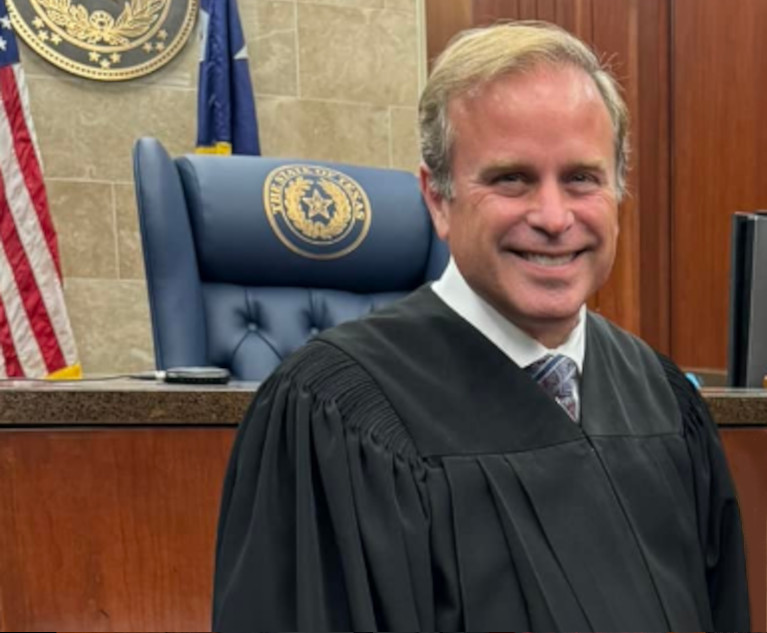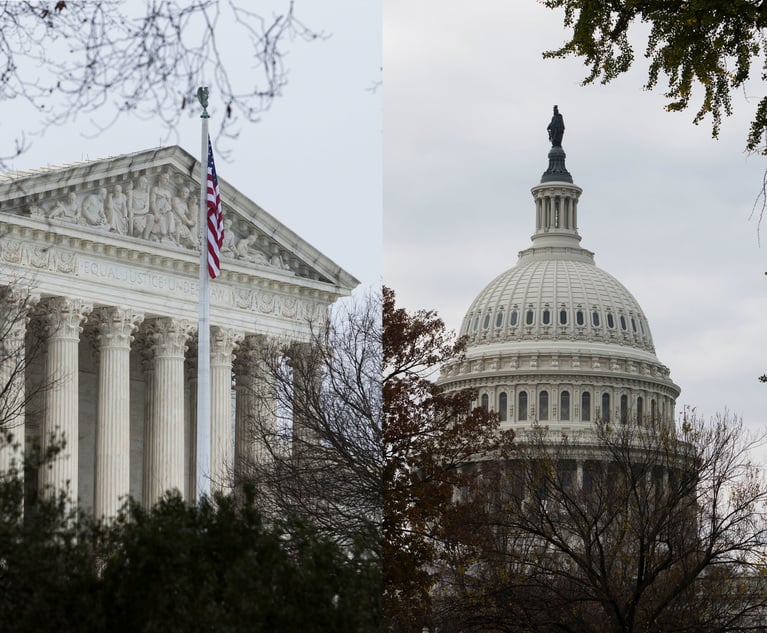 U.S. Supreme Court Justice Samel Alito speaks in the McCartan Courtroom at the University of Notre Dame Law School on Sept. 30, 2021. Photo: Matt Cashore/University of Notre Dame
U.S. Supreme Court Justice Samel Alito speaks in the McCartan Courtroom at the University of Notre Dame Law School on Sept. 30, 2021. Photo: Matt Cashore/University of Notre Dame The Marble Palace Blog: Justices as Speechmakers
Recent sharp-edged speeches by members of the high court have been controversial, but history shows that speechmaking by justices is nothing new.
November 18, 2021 at 11:09 AM
4 minute read
The original version of this story was published on National Law Journal
Thank you for reading The Marble Palace Blog, which I hope will inform and surprise you about the Supreme Court of the United States. My name is Tony Mauro. I've covered the Supreme Court since 1979 and for ALM since 2000. I semiretired in 2019, but I am still fascinated by the high court. I'll welcome any tips or suggestions for topics to write about. You can reach me at [email protected].
Supreme Court justices rarely give public speeches unless they are on a book tour. But in recent months, Justices Clarence Thomas, Samuel Alito Jr. and Amy Coney Barrett have made headlines with their speeches. Justice Stephen Breyer made notable remarks too, but he was in the book tour category.
Barrett told a Kentucky crowd that the Supreme Court is not "a bunch of partisan hacks." Breyer said it was "very, very, very wrong" for the court to refuse to block the controversial Texas abortion law. Thomas, speaking at the University of Notre Dame, said, "The [Supreme] court was thought to be the least dangerous branch, and we may have become the most dangerous." Alito, also speaking at Notre Dame, said it was "rank nonsense" for anyone to think that the high court was issuing orders late at night to avoid the news media.
The flurry of controversial utterances raised eyebrows. "Judges are not speechmakers," Indiana University Robert H. McKinney School of Law professor Gerard Magliocca told The Indiana Lawyer. "Speechmaking is something that politicians or professors do."
True enough, but a new article from the Journal of Supreme Court History suggests that speechmaking by Supreme Court justices is nothing new. "Speeches off the bench date to the Jay Administration [from 1769 to 1795]," wrote the article's author, Robert Whitaker, a Supreme Court and history scholar at Hudson Valley Community College.
Whitaker's essay focuses mainly on the Warren Court and the justices' speeches related to Brown v. Board of Education and other current issues such as the Cold War. Felix Frankfurter once counseled his colleagues to "not speak in public about matters of public law and intra-Court affairs," but Whitaker's yearslong research into justices' papers discovered more than 600 speeches given by the Warren Court justices.
I contacted Whitaker and asked him about the large number. "The speeches they gave," Whitaker said, "were intended in part to defend the court against criticism at a time when I think they saw their institution under great threat through massive resistance [against school desegregation] and court-curbing legislation and other measures." In his article, he said the speeches "represent political acts."
Were those talks viewed as inappropriate at the time? "I didn't see much evidence that it was controversial," Whitaker said. "In fact, quite the opposite. The justices' speeches, particularly Earl Warren's speeches from 1954, his first full year on the court, got significant national press coverage. They were reprinted in full in papers such as the New York Times. They were also broadcast on national radio networks."
Asked if the speeches by current-day justices echo those of the Warren Court, Whitaker said, "I don't think it's facing quite the same degree of threat." But he added, "I certainly do see some parallels. When the justices perceive the institution to be under attack or when they believe that the court's image and prestige are at risk, then that's when they're more likely to give speeches. It's not surprising at all."
NOT FOR REPRINT
© 2025 ALM Global, LLC, All Rights Reserved. Request academic re-use from www.copyright.com. All other uses, submit a request to [email protected]. For more information visit Asset & Logo Licensing.
You Might Like
View All
Mich. Attorney Faces One-Year Suspension in Ill. for Lying to Firm, Clients
3 minute read

Roberts Calls Court's Relationship With Congress 'Strained.' Who's to Blame?

Judicial Conference Declines Democratic Request to Refer Justice Thomas to DOJ
Trending Stories
Who Got The Work
J. Brugh Lower of Gibbons has entered an appearance for industrial equipment supplier Devco Corporation in a pending trademark infringement lawsuit. The suit, accusing the defendant of selling knock-off Graco products, was filed Dec. 18 in New Jersey District Court by Rivkin Radler on behalf of Graco Inc. and Graco Minnesota. The case, assigned to U.S. District Judge Zahid N. Quraishi, is 3:24-cv-11294, Graco Inc. et al v. Devco Corporation.
Who Got The Work
Rebecca Maller-Stein and Kent A. Yalowitz of Arnold & Porter Kaye Scholer have entered their appearances for Hanaco Venture Capital and its executives, Lior Prosor and David Frankel, in a pending securities lawsuit. The action, filed on Dec. 24 in New York Southern District Court by Zell, Aron & Co. on behalf of Goldeneye Advisors, accuses the defendants of negligently and fraudulently managing the plaintiff's $1 million investment. The case, assigned to U.S. District Judge Vernon S. Broderick, is 1:24-cv-09918, Goldeneye Advisors, LLC v. Hanaco Venture Capital, Ltd. et al.
Who Got The Work
Attorneys from A&O Shearman has stepped in as defense counsel for Toronto-Dominion Bank and other defendants in a pending securities class action. The suit, filed Dec. 11 in New York Southern District Court by Bleichmar Fonti & Auld, accuses the defendants of concealing the bank's 'pervasive' deficiencies in regards to its compliance with the Bank Secrecy Act and the quality of its anti-money laundering controls. The case, assigned to U.S. District Judge Arun Subramanian, is 1:24-cv-09445, Gonzalez v. The Toronto-Dominion Bank et al.
Who Got The Work
Crown Castle International, a Pennsylvania company providing shared communications infrastructure, has turned to Luke D. Wolf of Gordon Rees Scully Mansukhani to fend off a pending breach-of-contract lawsuit. The court action, filed Nov. 25 in Michigan Eastern District Court by Hooper Hathaway PC on behalf of The Town Residences LLC, accuses Crown Castle of failing to transfer approximately $30,000 in utility payments from T-Mobile in breach of a roof-top lease and assignment agreement. The case, assigned to U.S. District Judge Susan K. Declercq, is 2:24-cv-13131, The Town Residences LLC v. T-Mobile US, Inc. et al.
Who Got The Work
Wilfred P. Coronato and Daniel M. Schwartz of McCarter & English have stepped in as defense counsel to Electrolux Home Products Inc. in a pending product liability lawsuit. The court action, filed Nov. 26 in New York Eastern District Court by Poulos Lopiccolo PC and Nagel Rice LLP on behalf of David Stern, alleges that the defendant's refrigerators’ drawers and shelving repeatedly break and fall apart within months after purchase. The case, assigned to U.S. District Judge Joan M. Azrack, is 2:24-cv-08204, Stern v. Electrolux Home Products, Inc.
Featured Firms
Law Offices of Gary Martin Hays & Associates, P.C.
(470) 294-1674
Law Offices of Mark E. Salomone
(857) 444-6468
Smith & Hassler
(713) 739-1250








